Sat 6 Mar 2010
Archived Review: J. P. HAILEY – The Anonymous Client.
Posted by Steve under Authors , Bibliographies, Lists & Checklists , Reviews[3] Comments
J. P. HAILEY – The Anonymous Client. Tor, paperback reprint; 1st printing, August 1993. Hardcover edition: Donald I. Fine, 1989.
In the real world, the pseudonymous J. P. Hailey is known as Parnell Hall, as you may have already known on your own. Over the course of his writing career Hall has come up with three rather distinct series characters, two under his own name and one as by Hailey.
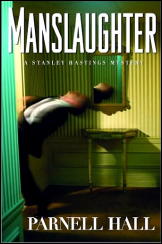
First by a year was Stanley Hastings, who first appeared in Detective (Donald I. Fine, 1987) as by Hall. Hastings is an outwardly inept and reluctant private eye who does small-time jobs for ambulance-chasing attorneys. He is also still around, or so it seems, last appearing not so very long ago in Manslaughter (Carroll & Graf, 2003).
Attorney Steve Winslow, to whom I’ll return in a moment, is the detective of record in the Hailey books, beginning the year after Hastings’ debut with The Baxter Trust (Donald I. Fine, 1988). He seems to have run out of cases to solve, though, since he hasn’t made an appearance in over 13 years now.
Picking up the slack has been crossword puzzle constructor Cora Felton, who beginning with A Clue for the Puzzle Lady (Bantam, hc, 1999), again as by Hall, has proven to be very popular, solving a long line of detective novels that come out on a regular basis ever since.
I’ve not read any of them, yet, but the way the elderly Cora Felton has been described, she seems to be a deliberate reverse take-off of Agatha Christie’s Miss Marple: crusty, promiscuous, and a lush. (If I have that wrong, please let me know. I’d hate to be sued for defamation of character.)
Let’s get back to J. P. Hailey, though. Here’s the list of the books in which Steve Winslow is the sleuth of distinction:
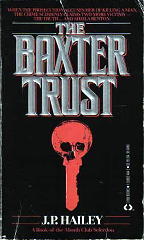
The Anonymous Client. Fine, 1989. Tor, pb, 1993.
The Underground Man. Fine, 1990. Forge, pb, 1994.
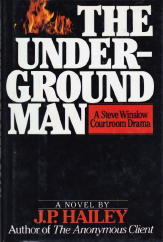
The Naked Typist. Fine, 1990. No paperback edition.
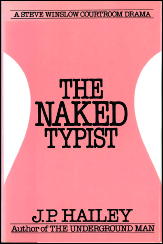
The Wrong Gun. Fine, 1992. No paperback edition.
Something is wrong here, very wrong. If a book with a title like The Naked Typist can’t get reprinted in a paperback edition, something is wrong with the world of publishing, totally. In any case, after two hardcovers for which the softcover rights were not sold, that was it, no more, end of series, nor do I know why.
Sometimes I doesn’t pay to wonder about matters not under your control, only to enjoy what you already have, and enjoyable this book is. To wit:
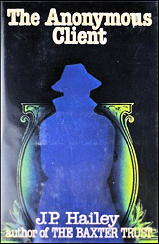
Steve Winslow is a lawyer with only one client, a wealthy woman (heiress?) a carry-over from the previous book. I’m not sure how correct I’d be if you were to try to pin me down about the details, but I think I have the wealthy part right.
In any case, as a result of whatever it was that happened in the previous book, Winslow is now Sheila Benton’s personal attorney. As a result he has a steady income, which is of course a good thing, and he’s also essentially only on call when needed. His secretary Tracy Garvin is so bored with nothing to do that at the beginning of this, the second book, she has just given him two weeks notice.
She reads mysteries, you see, and working for Steve Winslow is nothing like what happens to Della Street in the Perry Mason books. Not until, that is, the morning mail brings an envelope containing ten thousand-dollar bills as a retainer from a client who deliberately has not signed the note that comes with it.
It may be difficult to believe, but this creates a big problem. Winslow already has a client, and he cannot act on behalf of this new one in case there is a conflict of interest with the old one.
He also cannot return the money, because he does not know to whom to give it back. Luckily Winslow knows a private detective whose offices are in the same building, an old buddy named Mark Taylor, and if he doesn’t remind you of Paul Drake, you certainly don’t get out and read those old Erle Stanley Gardner books very often, do you?
Many complications ensue, and I won’t go into all of them – or any of them, for that matter – but if you were thinking that there’s got to be some really unusual courtroom shenanigans that occur, then you are thinking along exactly the same line that you should be.
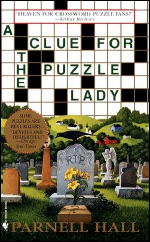
Here is a lengthy quote that I liked, lifted from page 129. It is in one of the aforementioned courtroom scenes, and Winslow is on the stand. (I wonder if Perry ever was, in one of his books – on the stand, I mean.)
“Yes I have.”
“What do you recognize it to be?”
“It is the list of serial numbers off of ten one thousand dollar bills.”
“Where did you get that list?”
“You just handed it to me.”
And later on, from page 228:
“I know,” Steve said. “We’re just laying the groundwork for an appeal.”
“I know, but I hate to lose.”
“Stick with me. You’ll get good at it.”
So there you have it. I enjoyed the jokes, and I enjoyed the complicated plot. Make that “really enjoyed” and “really complicated.” But I have a couple of comments to make – not guesses, you understand – but just an observation or two:
Parodies are fine – can this be anything else? – but some people may not like the razzing of their heroes. The F-word was never heard in any of Erle Stanley Gardner’s novels, but it is in this one, and several times over.
On the other hand, parodies can also fizzle, and badly, when the subject of the parody is no longer very popular or perhaps not even remembered. By the time Steve Winslow’s run of adventures was over, Perry Mason had long since vanished from the bookstore shelves and the TV screen, or very nearly so.
So maybe this was the reason someone’s interest in the series fell off, whether the publisher’s, the author’s, or the general public’s — or a combination thereof. I enjoyed this one, though, and if your sense of humor is anything like mine, you will too.
[UPDATE] 03-06-10. After a gap of four years, there have been (will be) two more books in the Stanley Hastings series: Hitman (2007) and Caper (2010). There are now 11 books in the “Puzzle Lady” series, with a new one appearing at a rate of about one a year.
But there have been no more Steve Winslow books, alas.
March 7th, 2010 at 11:24 am
I have never considered the Steve Winslow books to be parodies. Certainly (and admittedly) Hall owes much to ESG; these homages read like Perry Mason as written by A. A. Fair. I’ve read and enjoyed all the Mason and Cool/Lam novels, but I feel the Cool/Lams (and Hall’s Winslows) are superior to the Masons.
March 7th, 2010 at 1:15 pm
Jerry
One definition of parody (copied from the web):
“A parody is a work created to mock, comment on, or poke fun at an original work, its subject, author, style, or some other target, by means of humorous, satiric or ironic imitation.”
Emphasis on the humorous imitation, in this case, less on the mocking. But maybe there’s a better word.
“Homage: an expression of high regard, often used with “pay”; something that shows respect or attests to the worth or influence of another.”
There’s some of that, too! A lot, in fact.
Perry Mason as written by A. A. Fair, yes and no. I certainly see what you’re saying.
But Gardner in neither guise was not all that nimble with humor — although as Fair he certainly tried more often — and Parnell Hall is.
Are the Winslow’s better than the Mason’s?
I’d have to read more of them, but on the basis of (still) having read only the one, that’s what I’d wish, that there were more of them.
— Steve
March 7th, 2010 at 7:57 pm
Gardner was a bit more ‘nimble with humor’ in the Lester Leith series, but overall humor wasn’t really his thing. As for comparisons to Perry Mason, while many better writers than Gardner have done the legal mystery the fact is that like Doyle and Holmes, Gardner and Mason have a singular achievement that no one else is likely to equal or even approach.
There are certain writers who stake out a claim no one else can approach. Whatever you think of them critically writers like Gardner, Agatha Christie, Ian Fleming, Mickey Spillane staked out their particular area and while better writers come along, they can’t approach the originals.
You really can’t compare other writers to them, because they have transcended the genre. In a sense they have even transcended criticism. Love them or hate them, they can’t be ignored. They are the standard everyone else aspires to, like it or not.
The minute we invoke their name, even to say someone else is better, the writer in question comes in second.